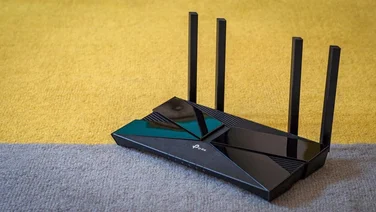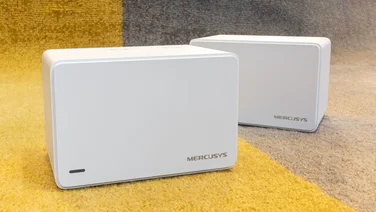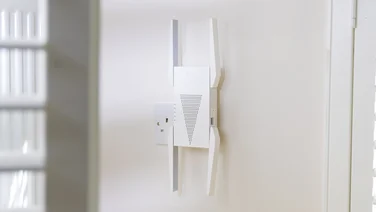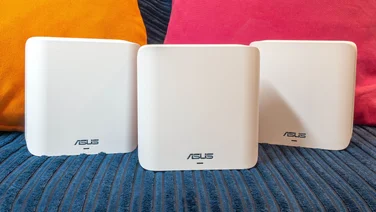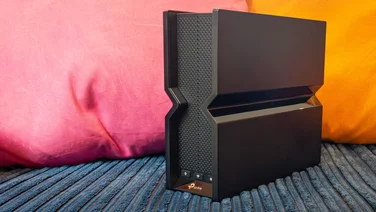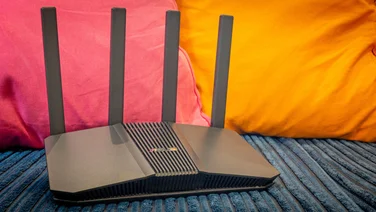To help us provide you with free impartial advice, we may earn a commission if you buy through links on our site. Learn more






- Fast enough for almost any home
- Well-rounded HomeShield features
- Steep price
- No Wi-Fi 6E
The latest meshes are moving up to Wi-Fi 6E but TP-Link’s Deco X68 sticks with regular Wi-Fi 6. That’s not necessarily a problem: the 802.11ax standard can cope with a busy household filled with connected gadgets and is fast enough to handle the full speed of almost any internet connection.
Aside from the wireless hardware, the Deco X68 has a lot in common with the 6E-enabled TP-Link Deco XE75 system. The physical designs are very similar, the software features are all but identical, and both meshes are equipped with tri-band radio configurations. In the X68’s case, you get one 2.4GHz radio and twin 5GHz transmitters, hard-wired as separate client and backhaul networks.
It’s an arrangement that helps maximise the available bandwidth and, in our tests, the Deco X68 performed well compared with other Wi-Fi 6 meshes. However, at its launch price of £321 for two stations it’s quite expensive: for just £29 more you can step up to the Deco XE75 and enjoy even faster speeds for 6E-compatible devices.
TP-Link Deco X68 review: What you need to know
The Deco X68 system is aimed at homes of between three and five bedrooms. It can fully replace your existing router, providing wider-reaching wireless coverage with its twin-station configuration. Or, you can switch it into bridge mode and use the two units as extra wireless access points for an established network.
The Deco nodes themselves are entirely identical. Each one contains a 2.4GHz radio, rated at a respectable 574Mbits/sec, plus a pair of 5GHz transceivers. The client-side radio supports a top connection speed of 1.2Gbits/sec with 4×4 MU-MIMO, while the backhaul connection goes up to 2.4Gbits/sec.






Alongside everyday networking duties, the Deco system can also handle basic security and parental control functions and it offers an optional subscription service for additional features.
TP-Link Deco X68 review: Price and competition
The Deco X68 is pricey but it isn’t the most expensive Wi-Fi 6 mesh around. Its immediate competition includes the Linksys Atlas Pro 6, which offers three stations for £380, and the Netgear Orbi RBK762S, at £420 for a twin-pack. Both are very fast and capable mesh systems.
It’s also possible to pick up a Wi-Fi 6E mesh system for a similar price. I’ve already mentioned the TP-Link Deco XE75 and, at £350 for two units, that’s arguably a better buy than the X68. The Google Nest WiFi Pro isn’t as fast, but it adds a third mesh station for £380.
You can pay a lot less for a perfectly functional mesh, too. The D-Link M15 Eagle Pro triple pack will cover the average home for just £163, although performance is merely fine. The Huawei Mesh 3 is another affordable option, currently on sale for just £170.
For a balance of value and performance, you might stretch to the £200 TP-Link Deco X50, or the Huawei Mesh 7 at £270. These systems still aren’t quite as fast as the Deco X68 but they’ll easily satisfy most people’s requirements.
READ NEXT: Expert Reviews Best Broadband Awards
TP-Link Deco X68 review: Design and features
The Deco X68 stations are rather plain-looking white cylinders. On the top, a glossy black pattern of concentric circles makes them look a bit like loudspeakers, while a multicoloured LED at the base indicates your network status. At the rear is a pair of gigabit Ethernet sockets, one of which connects to your internet modem.






While not exactly beautiful, the Deco nodes are small enough to slot neatly into wherever you want to put them, with a diameter of 105mm and a height of 168mm.
For setup and administration you’ll need to download TP-Link’s Deco app, for Android or iOS. Although it’s not made obvious, the management platform is cloud-based, so once your network is up and running you can use the app to access it from anywhere and even assign management rights to other people.
Unsurprisingly, the options and settings on offer are almost exactly the same as other Deco systems. You can check up on your network clients and activity, tweak your IP settings and adjust your Wi-Fi configuration. The Deco uses a single name and password for the 2.4GHz and 5GHz networks but if you only want to use one radio band you can disable the other.






The Deco also supports TP-Link’s HomeShield service, which provides a respectable set of network security, parental control and QoS functions. You can pay £54 a year for the full package, which includes active filtering of malicious content and flexible time limits for kids’ devices, but you may well be quite happy with the free tier, which includes on-demand scanning and category-based website filtering.






And for smart-home aficionados, the app also lets you control smart lights, plugs and network devices, with either one-touch shortcuts or automatic triggers. TP-Link’s Kasa appliances are supported, naturally, but you can also control Philips Hue bulbs, Samsung SmartThings sensors and KwikSet door locks.
Those who prefer to manage their network from a desktop browser will be disappointed. The Deco X68 does provide a web portal but this only lets you check up on your network status and clients – you can’t change any settings from here.
TP-Link Deco X68 review: Performance
The Deco X68’s tri-band design gives it a fair amount of bandwidth, but that doesn’t always translate to top performance. To test the Deco X68’s wireless speeds, I connected the main unit to the internet modem in my study and installed the other at the opposite end of the adjoining bedroom. I then hooked up an Asustor Drivestor 4 Pro NAS appliance to the main Deco’s spare Ethernet port, and connected to the 5GHz network from a test laptop equipped with an Intel AX210 Wi-Fi card.


Finally, I carried the laptop to various parts of my home and measured average transfer speeds when copying files to and from the NAS. Here are the results I saw, along with comparative figures from a selection of rival meshes:
The X68 is clearly in a performance tier above the cheaper Deco X50 and Huawei systems. That doesn’t mean those meshes are useless: they proved more than fast enough for video streaming, Zoom calls and so forth in every room. However, the extra bandwidth of the X68 means more devices can get top speeds at the same time and data can move around your internal network more quickly.
The Deco X68 also compared favourably to the Linksys Atlas Pro 6. It provided better short-range performance and very similar speeds in other rooms, while costing £59 less.
Next to its 6E-capable stablemate, however, the Deco X68 looks less impressive. Yes, over a 5GHz Wi-Fi 6 connection, the X68 was generally a little faster than the Deco XE75, only losing out on same-room speeds. The margin wasn’t large enough to be noticeable in everyday use, however.
When I enabled Wi-Fi 6E on my test laptop, the XE75’s 6GHz support enabled it to race ahead of the X68. If this seems like an unfair contest, that’s sort of the point: any future devices that come onto your network are likely to support Wi-Fi 6E but the Deco X68 won’t be able to realise their full performance potential.
READ NEXT: The best Wi-Fi extenders to buy
TP-Link Deco X68 review: Should you buy it?
The Deco X68 is a simple, effective mesh system but we’re hesitant to recommend it – simply because the Deco XE75 costs barely any more, and is ready with even better speeds for the incoming generation of Wi-Fi 6E devices.
If you’re certain Wi-Fi 6 is sufficient for your needs, however, then the Deco X68 is hard to fault. Although expensive, it performs well compared with other meshes in its price range and TP-Link’s management software is sophisticated and flexible enough to meet the needs of almost any home network.

